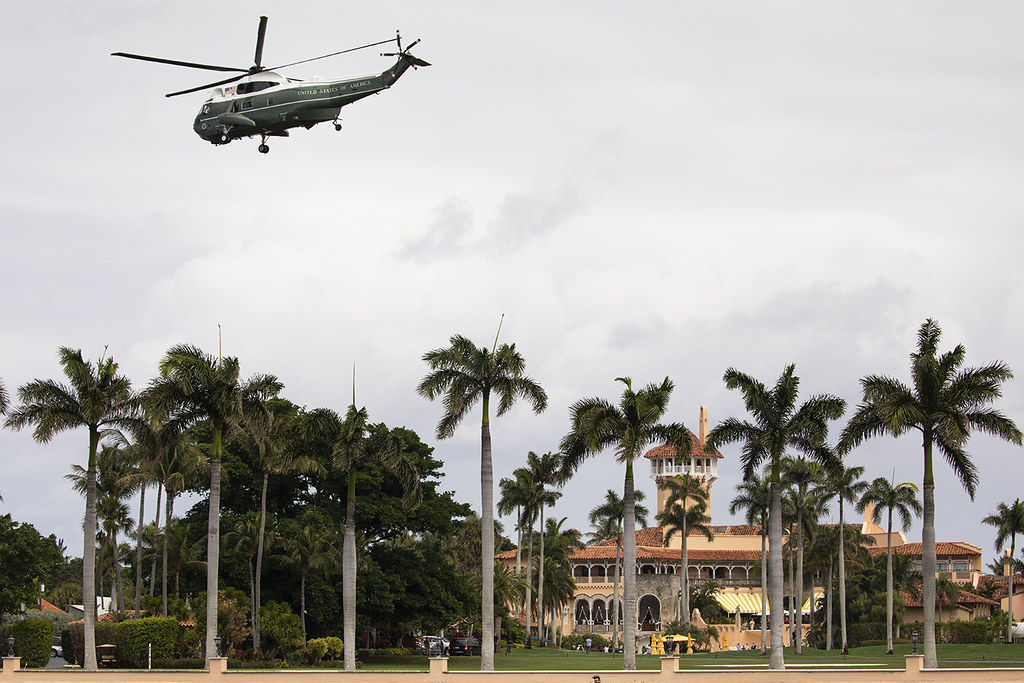Donald Trump and the Espionage Act
As president, Trump used the Espionage Act aggressively to prosecute leaks of information to the media. Now, Trump may be caught up in the act himself.

Published by The Lawfare Institute
in Cooperation With

It isn’t often that the 1917 Espionage Act is front page news, but the century-old law is having a moment in the spotlight. On Aug. 12, the Justice Department unsealed the search warrant executed at the FBI’s recent search of Mar-a-Lago—the resort, occasional wedding venue, and primary home to former President Donald Trump. The warrant authorizes the seizure of materials “constituting evidence, contraband, fruits of crime, or other items illegally possessed in violation of 18 U.S.C. 793, 2071, or 1519.”
18 U.S.C. § 793 is the Espionage Act. What aspects of the act are relevant to the search? And what can they reveal about the nature and scope of the Justice Department’s investigation?
The part of the Espionage Act that is likely most relevant in this case is § 793(d). It applies to individuals who lawfully accessed material:
“relating to the national defense,” and who proceeded either willfully to convey it to “any person not entitled to receive it,” or willfully to “retain[] the same and fail[] to deliver it on demand to the officer or employee of the United States entitled to receive it.”
The statutory language is sparse. Over the years, courts have narrowed it through construction, although even the judicially construed terms remain quite capacious. The most important judicial refinement concerns the term “relating to the national defense.” Although acknowledging that “national defense” is an extremely far-ranging concept, courts have tacked on two additional components. First, the materials must be “‘closely held’ in that [they] ... have not been made public and are not available to the general public.’” Second, the disclosure must be “potentially damaging to the United States or [potentially] useful to an enemy of the United States.” Although the Espionage Act does not mention the classification system—which predates the act’s passage—courts have used classification status to inform their assessment as to whether materials were “closely held.” They have also relied on it to determine who was “entitled to receive” information. Additionally, courts have interpreted the willfulness requirement to mean that the offending conveyance or retention must have been done knowingly.
The receipt accompanying the unsealed warrant identifies a number of classified items that were removed from Mar-a-Lago, including some marked “Top Secret” and “Sensitive Compartmented Information.” Absent some evidence belying these labels—for example, evidence that the government treated the information as public in nature—they are strong indicia that the materials were closely held. And although the materials’ contents are not publicly known, they would likely fall within the highly malleable category of material whose disclosure “would be potentially damaging to the United States or might be useful to an enemy of the United States.”
What about Trump’s purported “standing order” to declassify information sent to Mar-a-Lago? Trump has protested that the information was no longer classified. Specifically, Trump’s office released a statement on Friday night—via a Fox News guest who read it on the air—claiming that Trump had a “standing order” while president that materials “removed from the Oval Office and taken to the residence were deemed to be declassified the moment he removed them.” As others have noted, even if such an order exists, it is not at all clear that its existence alone sufficed to declassify every document that made its way to Mar-a-Lago. For example, Executive Order 13526—which governs the classification system and which Trump did not purport to revoke—specifies criteria to justify declassification. The criteria entail substantive judgments about the nature of the relevant information and its relationship to national security and the public interest. Executive Order 13526 makes no provision for blanket declassification based on personal convenience.
Far more importantly, even if Trump did and could declassify the documents via little-known oral, written, or telepathic order, the change in status would not necessarily matter under § 793(d). Recall that the provision does not mention classification. Rather, courts have interpreted its term “relating to the national defense” to include a requirement that the relevant information be closely held by the government. If Trump himself deemed documents unclassified but never changed their classification markings, told few if any people that he had changed the information’s status, and failed to make the information subject to otherwise applicable public records laws, then the information remains fairly characterized as closely held.
I have written a number of articles relating to the Espionage Act. In all of those pieces, I expressed concern that the act is wildly vague and overbroad, and that it raises serious problems under the First Amendment. I have co-written two amicus briefs to the same effect. My focus in those articles and briefs was the act as applied to government employees who leak information in the public interest to the media. The upshot in these writings is that the courts and Congress should enable the public interest to be weighed in the balance in liability and sentencing determinations. These concerns are not implicated in this case. That is, there is no indication that Trump sought—in maintaining access to the documents in question—to enlighten the American people regarding government abuses or other important information.
Still, the Trump saga highlights the act’s extraordinary breadth and the consequent need for reform. Section 793(d) effectively draws no distinction between a spy, a whistleblower, and a former president who hoards highly sensitive national security information for his own amusement or private gain. Worse still, § 793(e), which largely mirrors § 793(d) but applies to those with unauthorized access to information, opens the door to prosecuting journalists.
As president, Trump happily embraced the Espionage Act’s breadth, outpacing even his prolific predecessor in initiating Espionage Act prosecutions for alleged leaks of information to the media. It would be ironic were his own legal travails—however unsympathetic the facts of his case may be—to spark a long overdue reassessment of the act.




